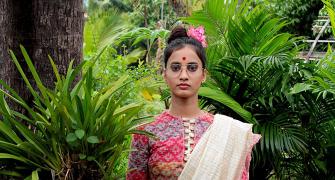Two young dhaakad designers tell us why they want to dress up the First Lady of Bollywood.
Resham Karmchandani and Sanya Suri -- both graduates from The Pearl Academy, New Delhi and co-founders of The Pot Plant -- made their debut as GenNext designers at the Lakme Fashion Week Summer/Resort 2017. "We haven't slept for two weeks as it has been so crazy preparing for the eight outfits for our show," says Sanya.
Their aim is simple: To reduce fashion waste.
Sounds like such a tall task, but not for Sanya and Resham.
Ask them how they do it, and here's what they have to say: "We design clothes in such a way, that there is very little fabric wasted. And just in case there is leftover fabric, we use it to make sleep masks, buntings, bow ties, cushions for gifting, etc. Even the hangers, which we use to hang our garments, are upcycled with waste fabric.
"We would love to have bigger machinery which cuts up fabric and makes recycling easier, but we have a long way to get there. So now we try and do what is within our means," says Resham.
The duo's childhood memories of living consciously (from reusing paper and saving dairy pages) led to the conception of The Pot Plant, which started as a simple project to make lives greener and eco-conscious.
Today, the likes of Kiran Rao have been spotted in their outfits.
In an e-mail interview with Rediff.com's Anita Aikara, the duo talk of their experiments with 'zero waste' through The Pot Plant.
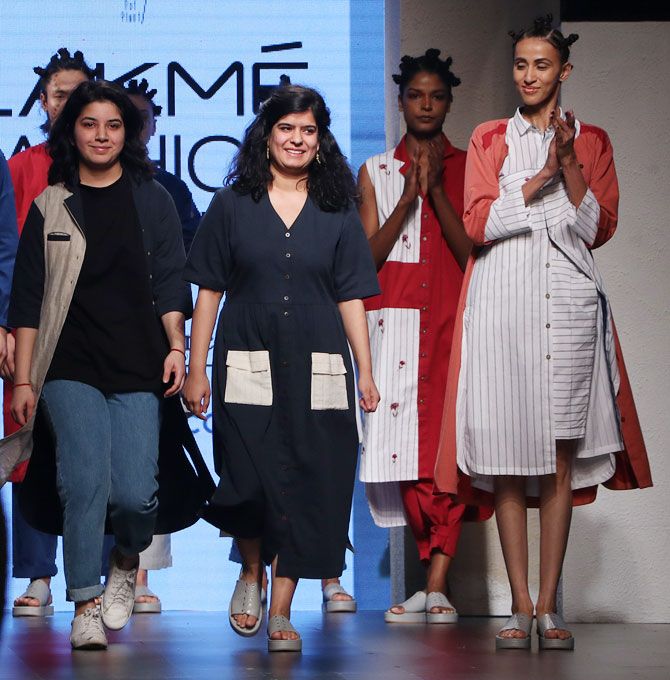
Photograph: Hitesh Harisinghani/Rediff.com
Sanya Suri
Age: 25
Hometown: New Delhi
Sanya is the fresh stroke of colour that makes The Pot Plant a fun place to be.
Co- founded by her, the label is her canvas and her one true love.
Resham Karmchandani
Age: 26
Hometown: Agra
Resham is Sanya's alter-ego and the second parent of The Pot plant.
Her love for books and nature pours out in her work.
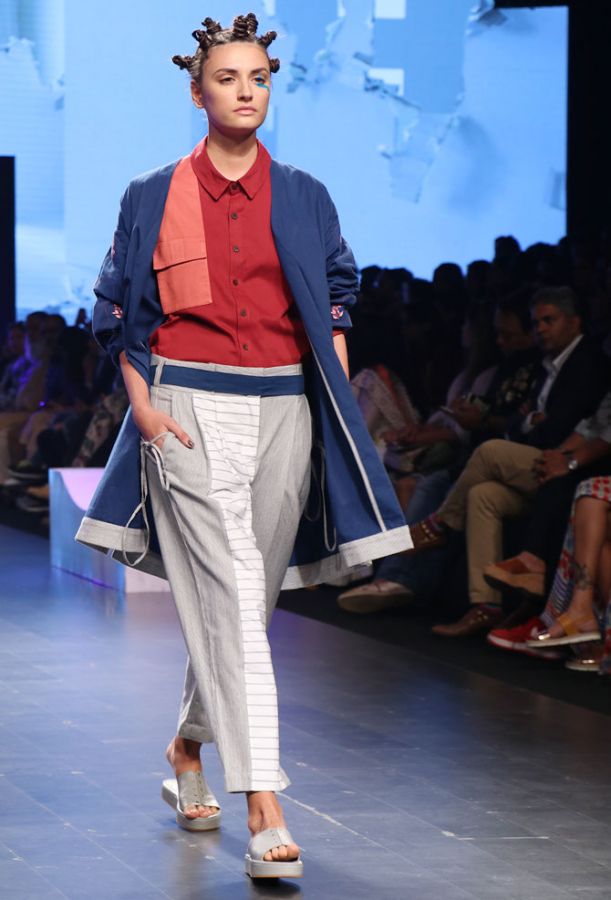
Photograph: Kind courtesy Lakme Fashion Week
How did fashion happen to you? Are any of your parents associated with fashion?
Sanya Suri: I grew up around fashion, textiles and design.
My mother is a fashion designer, who pursued her interest in the design field to create a well-oiled machine that went on to become a successful business.
I have seen her work endlessly and passionately with fashion and design and that's where my inspiration came from.
Even as a child my mother used to involve me in her work -- she used to ask me about the colour coordination and I would tell her which colour I liked.
I had a small thermocol office as a child and I'd sit with my mother in her office. I have seen her interact with clients.
As long as I can remember I have been a part of my mother's design sensibilities and decisions. So a career in fashion was the next natural step for me.
Resham Karmchandani: My mother is a homemaker and my father is into the business of generators and agricultural machinery. Nobody from my family is related to textiles.
My mother used to love textiles a lots, so my father used to get them for her.
I grew up in an environment where customised clothing was not a luxury but a way of life.
I remember my father bringing home exquisite textiles from different states he visited for business. So textiles have been a huge part of my life.
I decided to pursue fashion as my career because I was passionate about tailored clothing and that's how 'fashion' happened to me.
When we graduated school, the Indian fashion industry was growing wings.
There was more and more international recognition and awareness and it was a new career choice.
That's what prompted us as we wanted to explore a different arena.
Why the emphasis on reducing waste?
Resham Karmchandani: My father used to travel a lot. When he used to return home, we'd get some beautiful fabrics from all over India like chikankari, bandani, pathola, etc. as my mother loved collecting it.
Since childhood, my family made me realise the importance of hands-me-down clothing.
I have a big family, so I have worn clothes that were handed down to me by my sisters, mother and aunt.
I haven't been into shopping every few months.
I realise what it is to cherish clothes and that's why I try to make clothing that can be worn again and again.
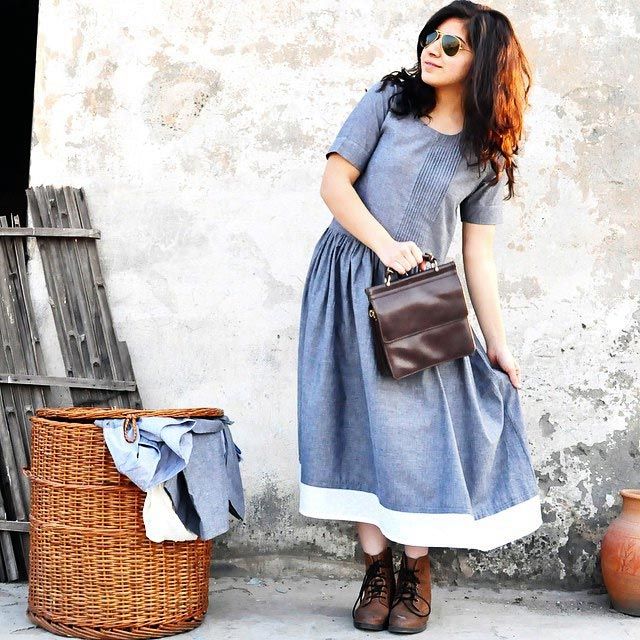
Photograph: Kind courtesy The Pot Plant/Instagram
Birth of The Pot Plant
Resham Karmchandani: We met in college and then went on to became best of friends.
Seven years since that fateful day and we now have a brand together!
A childhood of living consciously and the love for timeless hands-me-down clothing is what brought us together for the inception of The Pot Plant.
Inspired by a hundred stories lived and experienced by people born in the non-mechanised era, we aim to set the bar for distinctive style, fuss free silhouettes and unconventional use of natural fabrics.
The design process abides by 'less is more' to create something that is about utility and style.
Designers who inspire you
Resham Karmchandani: Rahul Mishra and Yohji Yamamoto. The former for the beautiful details and the amazing fabric that he does and Yohji Yamamoto for the simple clean designing.
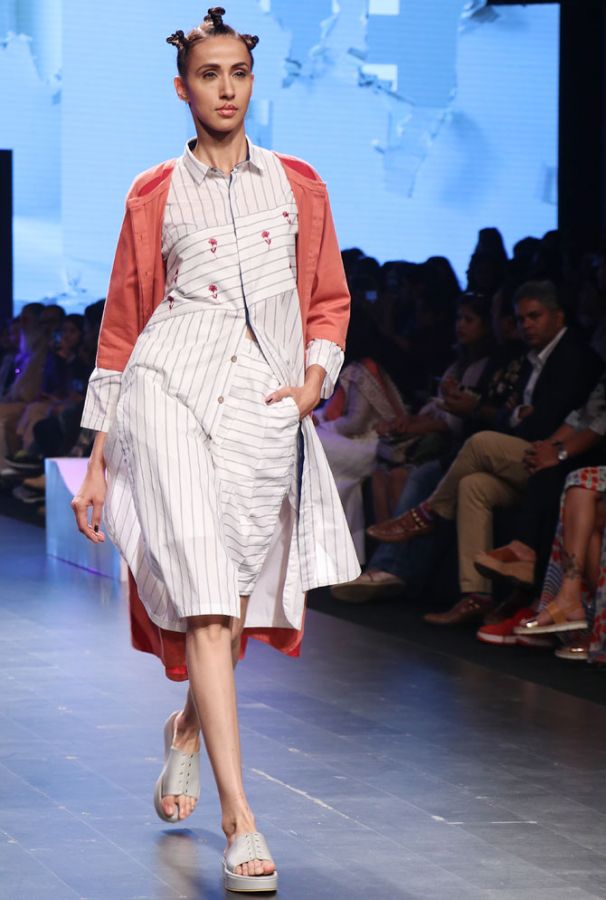
Photograph: Kind courtesy The Pot Plant/Instagram
The collection: Beyond the Binary
Sanya Suri: Fashion is perhaps the most welcoming industry when it comes to people expressing who they are through what they wear.
It is a mass revolution with cultures and sub cultures that help people express their viewpoint or stand up for what they believe through how they dress. A great visual impact!
Our collection is along the same lines. 'Beyond the Binary' is a gender fluid collection abiding by fashion beyond and irrespective of the gender spectrum.
The cuts remain crisp and clean with our signature anti-fit look.
Exaggerated sleeves, oversized fitting and gender fluid cuts have been accentuated with embroidered floral motifs. 100 per cent cotton fabrics in fresh staple hues comprise this collection.
Working towards zero waste by repurposing and upcycling fabrics
Resham Karmchandani: It's not too much work.
It's a choice that we made and we are happy to abide by it. We try to reduce waste in all our collections. We try and design the clothes in such a way that we end up using minimal fabric.
And if some fabric gets left behind, we recycle them into products that you can use in your daily lives like sleep masks, buntings, ties, bow ties, etc. We even upcycle the hangers with left out fabrics.
How much ever we can do being a small brand, we do it.
All our dyes and colours used are chemical free.
We work towards zero waste because we understand that is important to promote slow fashion. We are eco-warriors :)
Recyclling and upcycling requires a designer to think about the entire product cycle of the product.
It may not necessarily abide by the current fashion trend which is why not many designers indulge in it but of late there has been a paradigm shift in how designers and consumers think.
We need trends and timeless pieces -- we need to find that balance that keeps the world going.
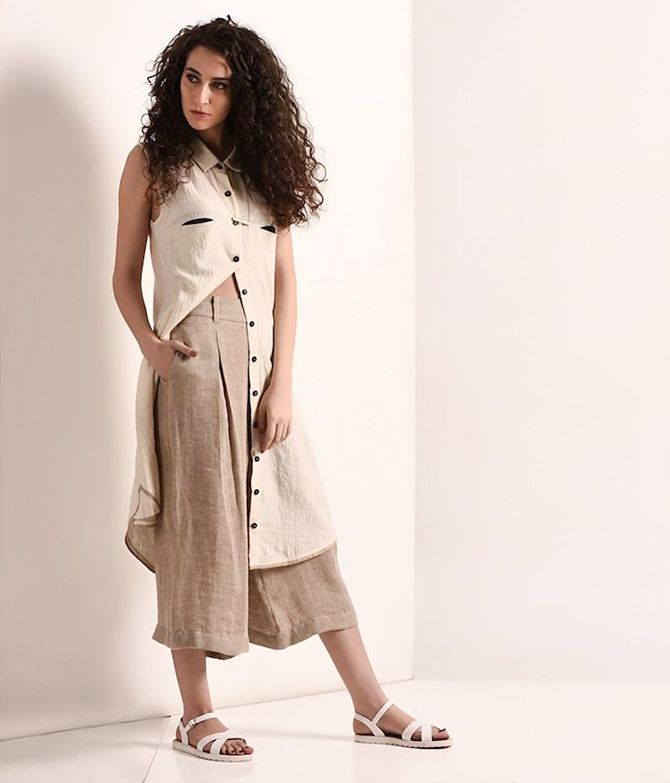
Photograph: Kind courtesy The Pot Plant/Instagram
Retailing on Facebook
Sanya Suri: The online market today is huge.
People want to shop from the comfort of their homes or while travelling to work.
Online shopping and e commerce websites make this possible so it was important for a new brand like us to be out there and make our presence known.
Facebook and even Instagram are a huge business tool today. It is a massive platform and it really helps a brand grow.
Sustainable fashion becoming a mass trend in India
Resham Karmchandani: We can see the change happening and hopefully in the years to come, sustainable fashion will be an important part of the industry.
I think the Indian fashion industry is doing great.
It is surreal to watch new and classic designer brands co-exist.
The consumer is more open to new talent and we are changing for the better as an industry.
Making garments a collector's item
Resham Karmchandani: We want people to cherish the garments we create. We don't want them to use it for a few months and then get rid of it.
We want to do clothes that people keep with them -- we want these garments to become their second skin.
Our customers to keep wearing our garments again and again. I am a very fussy shopper and I don't shop very often. Even if I have clothes, there're a few pairs that I will keep on wearing. That's the connect I want with my customers. We make our garments easy for layering. So if one day I want to wear it with a skirt, the other day I can wear it with a pair of pants.
We try and do easy separates, because we understand that our customers cannot wear the same outfits everyday.
Sanya Suri: I think if our clothing is good, then people would want to wear it over a longer period of time.
One celebrity you would like to dress
Resham Karmchandani: We would like to dress Kiran Rao in our outfits.
She has worn our outfits before and carried it off beautifully.
Sanya Suri: Yes! I would really love to dress her. She really slayed it in The Pot Plant top at the MAMI film festival.
Top fashion trends in fashion in 2017
Sanya Suri: Stripes -- it has become a staple and we are excited to see how far it goes.
Style mantra
Resham Karmchandani: Comfort comes first.
Advice on zero waste for seasoned Indian designers?
Resham Karmchandani: With designers the problem is that they can't just do one clothing.
I think there is a niche for everyone and these designers are doing a particular type of clothing because there is a demand for it.
We are in an era that we can't expect these designers to go back 10 years and start thinking of zero waste.
I hope they are doing something in their own way. For now I am happy that a lot of these designers are working on textiles that are Indian based. That's a good move too!
People's wardrobe should have a mix of clothes. You should start changing now, from 10 per cent natural fabrics to 20 and then 100 per cent. As a consumer, it is your duty.
What next?
Sanya Suri: Keep this pace going, make a mark and find our niche in this industry.
I had always been fascinated by natural dyes, so we want to try more of that in our next collections. Be it embroidery or intricate patterns, we want to experiment more with small designs.



